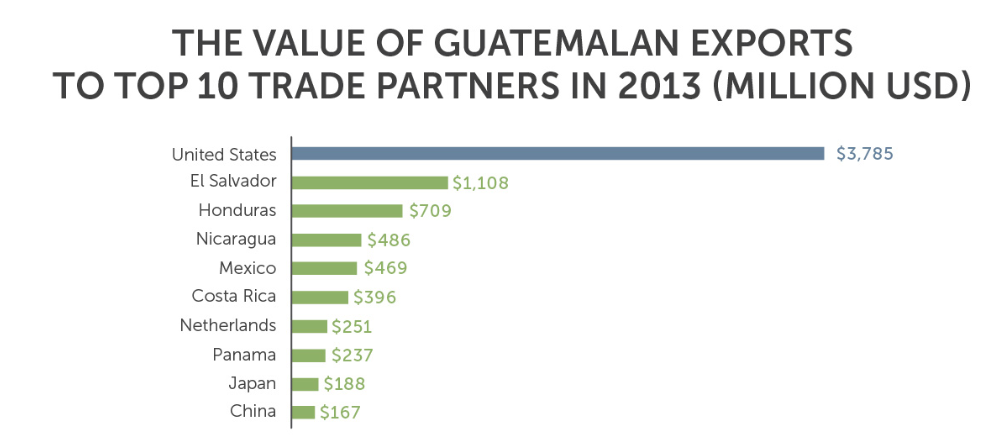
Guatemala’s main trading countries
Guatemala, a vibrant country in Central America, engages in diverse trading relationships with several countries around the globe. Its economy relies on exports of agricultural products, textiles, and manufactured goods, while imports include machinery, fuel, and raw materials. Guatemala’s primary trading partners reflect both geographic proximity and complementary trade needs, with the United States, Central American nations, and select European and Asian countries standing out.
United States
The United States is Guatemala’s top trading partner, accounting for a significant share of both imports and exports. This relationship is supported by the Central America-Dominican Republic Free Trade Agreement (CAFTA-DR), which facilitates trade by reducing tariffs and opening up market access. Guatemala exports a wide range of goods to the U.S., including coffee, bananas, sugar, and textiles, with agricultural products making up a substantial part of the trade flow. Guatemalan coffee is particularly popular, with the U.S. being one of the largest consumers. In return, Guatemala imports machinery, electronics, fuel, and other manufactured goods from the United States, making the relationship crucial to Guatemala’s economic stability and development.
Mexico
Mexico is another important trading partner, both as a neighboring country and as a regional economic leader. With shared borders and cultural ties, Mexico and Guatemala have a strong trade relationship. Key Guatemalan exports to Mexico include fruits, vegetables, and coffee, while Mexico exports processed foods, electronics, and petroleum products to Guatemala. Trade between these two countries is facilitated by regional agreements that encourage easier movement of goods, as well as strong diplomatic ties. Mexico is also Guatemala’s main supplier of certain essential goods, including building materials and intermediate goods used in manufacturing.
El Salvador and Other Central American Nations
Guatemala’s trade within Central America is essential to its economy. El Salvador, Honduras, and Nicaragua are some of Guatemala’s main partners within the region, with the Central American Common Market (CACM) promoting freer trade across these nations. These countries have similar agricultural economies, so trade often includes goods that can be exchanged based on seasonal demand and production. For example, Guatemala exports coffee, sugar, and processed foods to El Salvador, while importing goods such as grains, textiles, and electronics. The shared economic interests, geographical proximity, and established infrastructure make trade within Central America both practical and profitable for Guatemala.
China
In recent years, China has become an increasingly important trading partner for Guatemala. Though Guatemala does not formally recognize the People’s Republic of China diplomatically, trade ties continue to grow. China is a key supplier of electronics, machinery, and manufactured goods, which are vital for Guatemala’s industrial and consumer markets. Chinese products are generally more affordable, which appeals to Guatemalan consumers and businesses looking for cost-effective options. Guatemala exports limited products to China, primarily raw materials, but the relationship is significant for its import needs.
European Union
The European Union (EU) is also a notable trading partner for Guatemala, with countries such as Germany, the Netherlands, and Spain being primary destinations for Guatemalan exports. Guatemala exports products like coffee, bananas, and sugar to the EU, which has a high demand for these goods. The Association Agreement between the EU and Central America facilitates trade by reducing barriers and improving market access for Guatemalan products. The EU is known for its high standards in quality and sustainability, which motivates Guatemalan producers to meet international standards, especially in agricultural exports.
Japan and South Korea
Asian countries like Japan and South Korea have established strong trade relationships with Guatemala as well. Japan, for instance, imports Guatemalan coffee, sugar, and seafood, while South Korea imports textiles and agricultural products. In return, Guatemala imports vehicles, machinery, and electronics from these countries. These trade relationships are supported by diplomatic cooperation and trade agreements that help facilitate smoother exchanges and increase the flow of goods.
In conclusion, Guatemala’s main trading partners contribute significantly to its economy by providing essential markets for its exports and a diverse source of imports. This network of relationships is strategically built on geographic, economic, and political ties, ensuring that Guatemala remains an active participant in global trade.







Leave a Reply